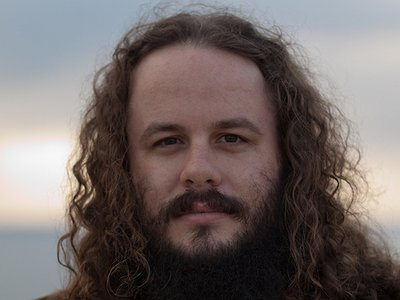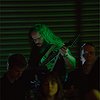Page 2
How do you make use of technology? In terms of the feedback mechanism between technology and creativity, what do humans excel at, what do machines excel at?
My favorite technology is a well–sharpened pencil (and a dull one for beams) paired with a ruler. Close behind that are a cell phone and a computer. Though I prefer to hand-write my sketches and early drafts of pieces, I engrave my final scores using Sibelius. The ability to shoot video on a phone has really changed the workshop experience for me. Now, when I find something special with a collaborator, it is easier than ever to make a record of it for future reference when I’m alone at my desk. I’ve also become dependent on the ability to text questions and ideas to people as we’re working on music together. Something I’ve just started doing, which is coming in handy, is that I’ve started keeping PDFs of all of my scores on dropbox. This has allowed me to open or send a score at just about any time if someone sends me a question or needs to see something. So, my uses of technology are mostly related to ease of access, memory aids, and communication. As far as how I compose my music, I’m pretty old fashioned. I like to sit down and work things out by hand.
Collaborations can take on many forms. What role do they play in your approach and what are your preferred ways of engaging with other creatives, including the artists performing your work?
Collaboration is crucial for me. I tend to stay in close contact with people when I’m composing music for them. I like to show my sketches to the people I’m writing for. The process of trying things out significantly shapes the way that I finish my pieces. Giving people the opportunity to respond to how I’m thinking of notation, and how material is working in general, is important to me. Sometimes, I’ll write the same thing in a few different ways, or make subtle variations to how something unfolds. Often, meetings like these will happen several times while working on a project. Especially if we live in the same city. For non–local collaborations, this process happens over phone calls, emails and texts (a lot of this still goes on in my local collaborations as well). I frequently text photos of passages I’m working on to make sure it makes sense, and will work. I hate the idea of sketching a big part of a piece only to learn later that I’ve misunderstood how a particular technique works, or that an interval can’t quite be reached after it has become integral to something much bigger. Doing this kind of work has done a lot to develop how I think about instruments and the people playing them. I’ve become very attached to other musicians I collaborate with. Very often, the piece I’ve written and who I’ve written it for become inseparable in my mind. I cherish these relationships.
How is writing the music and having it performed live connected? What do you achieve and draw from each experience personally? How do you see the relationship between improvisation and composition in this regard?
For me, this is very connected. My imagination of sound is driven by physical impulses and my imagination of how the people I’m writing for perform. When I’m composing, I’m doing my best to anticipate how it will be experienced live. I get a lot of joy hearing my music performed, especially when it is by a long-time collaborator who can create a sense of spontaneity within a precisely notated piece. Ashley Walters, Stephanie Aston, and gnarwhallaby all have a way of making the music I’ve written for them feel like natural extensions of themselves, with the energy of an improvisation.
Time is a variable only seldomly discussed within the context of contemporary composition. Can you tell me a bit about your perspective on time in relation to a composition and what role it plays in your work?
Time (or more specifically, pacing) is something I spend a lot of time thinking about. I do a lot of fussing over “how long should this last,” as I sit with a stopwatch imagining a certain texture, or transition in my head. I repeat this process several times per event/section and take an average of times that I wound up with (stopping the clock when it feels like a section needs to be done). All of the various attempts tend to be within a few seconds of each other. Once I start having complete drafts of pieces, I leave plenty of time to work my way through the entire piece (in time) marking spots that feel like the pacing isn’t right yet. My goal isn’t just about finding the time that feels right to move on. Most of my pacing decisions are driven by finding the moment that feels just right to me and then slightly shortening or lengthening to manage my desired flow of structural tension.
How do you see the relationship between the 'sound' aspects of music and the 'composition' aspects? How do you work with sound and timbre to meet certain production ideas and in which way can certain sounds already take on compositional qualities?
I love to manipulate sound. I get very excited when I find a sound that is already complex and interesting by itself, but I find myself needing to create a context for a sound to be compositional for me. The early parts of my collaborations with people involve searching for sounds. Sometimes the most incredible sounds get left behind because I can’t find a context for them.
Our sense of hearing shares intriguing connections to other senses. From your experience, what are some of the most inspiring overlaps between different senses - and what do they tell us about the way our senses work? What happens to sound at its outermost borders?
Physical/muscular sensation is what overlaps the most with my experience of sound/music. I experience emotion (especially excitement) in a very physical way. My muscles tense, I get a little short of breath, my skin tingles. Sometimes I hear something so intense that I find myself holding my breath and tensing my stomach muscles. When I imagine my own musical gestures, they’re frequently driven by my sensations of physical impulses. I also have an enthusiasm for going to metal shows where the music is loud enough for me to feel it. The connection between physical sensation and audition can create very meaningful listening experiences for me, especially when one can fill in the gaps for the other.
Art can be a purpose in its own right, but it can also directly feed back into everyday life, take on a social and political role and lead to more engagement. Can you describe your approach to art and being an artist?
My approach to art is about relationships. What makes me continue to do this, and to continue loving it, is the relationships that grow out of making music. The people to whom I feel the closest are the people with which I get to make music. There are a lot of awful things in the world, and focusing on an art form that fills me with so much love for the people around me is my way of trying to create something positive (despite how bleak my music sometimes ends up sounding).
It is remarkable, in a way, that we have arrived in the 21st century with the basic concept of music still intact. Do you have a vision of music, an idea of what music could be beyond its current form?
I’m not sure that I have a real vision of what music is now, let alone in the future. I can talk about what things are important to me in music, but I struggle to offer anything more general. More people seem to be open to broader definitions of what music is, though there are still people who are ready to call something “not music” because its harmonic strategies differ from what is familiar. Aside from aesthetic preferences, overall perception of what a musical expression is has become extremely broad. I think this is important, and assume it will continue. Many people are able to find meaning/expression through a wide variety of sound and performance practices. It feels harder for me than ever before to define “what music is.” I’m also not particularly comfortable trying suggest what it “isn’t.”






